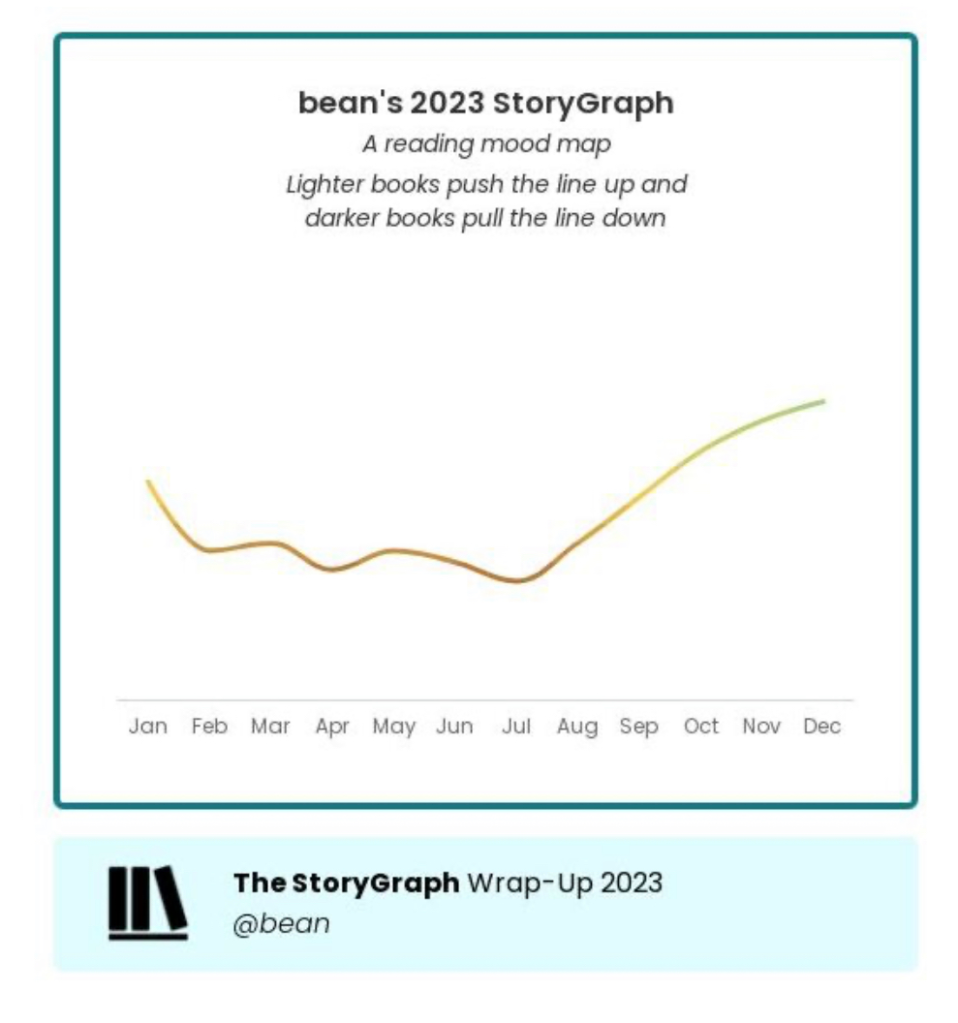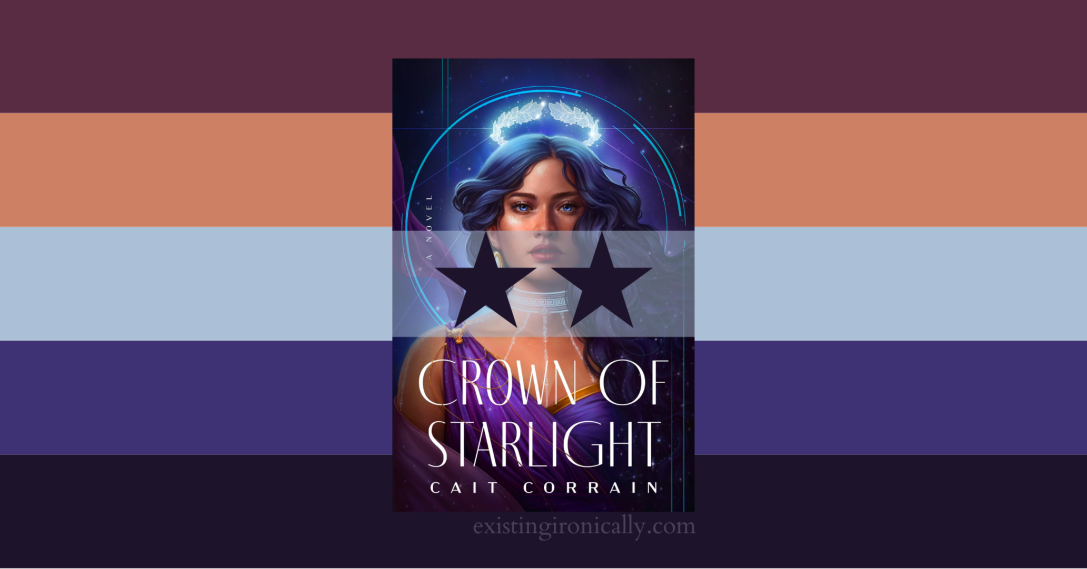I have access to this book because one of my close friends let me borrow her ARC. While many consider their reviews to be external guides to help or spark discussions with other readers, I have primarily considered my reviews to be more internal reflections. I write reviews because I find it interesting to discuss and analyze the contents of a book. This is why I’m publishing this review of Crown of Starlight by Cait Corrain, even though it may never be published. This was originally planned just to go on GoodReads but as of right now the site is not allowing anyone to leave ratings or reviews so…
The entire bookish community has heard of the Cait Corrain scandal. Tldr; An insecure debut author made numerous fake accounts on GoodReads and review-bombed others in her debut year– some even at the same imprint and with the same agent. After a swift but convoluted fiasco of events in which she was proven to be the culprit, Corrain was dropped by her agent and her publisher announced it would no longer be publishing Crown of Starlight or any other book on her deal.
Does that mean the rights get reverted back to her? Will she be able to seek out a new publisher after an appropriate statute of limitations? Will anyone even want to work with her after such a tarnished reputation? Will she self-publish? Can she self-publish? Who knows… who knows… I will be spoiling the book either way.
Before we continue, please consider supporting the affected authors, most of whom are authors of color. I have linked a GoodReads list that compiles all the books to support here.
Crown of Starlight is pitched as a spicy sci-fi reimagining of the tale of Ariadne and Dionysus. Ariadne has grown up in the cold, cruel, empire of Crete, pruned by her oppressive father to be its next ruler. Every year, per a treaty between Crete and the empire of Athens, numerous Athenian warriors must be sacrificed to the monster living in the labyrinth of Crete, the Minotaur, Ariadne’s half-bull and feral half-brother. This year, though, Ariadne is placed in charge of the ceremony to prove her worth, but instead, she views it as a means of escape. And this year, the prince of Crete himself, Theseus, comes to defeat the Minotaur or die for his people. They work together to kill the Minotaur and escape Crete, and shortly after, Theseus takes Ariadne as a prisoner to leverage her against her father.
Then begins the actual romance of the book. Ariadne escapes and runs into Dionysus, the God of Wine, Hedonism, and other things. He has a cult of good times. He takes an instant liking to her, offering her his protection, and eventually proposes a mutually beneficial marriage between them. To be accepted into Olympus, he needs devotees from all major empires, but has none on Crete because Cretains worship the Moirai (not the Gods). But if Ariadne pretends to be devoted to him, then he will be allowed on Olympus again, and if she marries him, she can accompany him there and finally be safe from her father. She agrees, slowly emerging from her self-loathing and sexually repressed shell, falls in love with him, smuts it up, rejects Olympus to prevent a war between Crete and Athens, dies, and then is resurrected to spend near eternity with Dionysus.
You might have read that and went, “Wow, that’s a lot of story, no wonder the book is 560 pages!” WRONG! It’s 560 pages because it is horrifically overwritten. The pacing is another issue, though not as egregious.
First and foremost, the prose style is, what I would describe as, fanfic casual. It’s the sort of tongue in cheek humor that didn’t quite mesh well with the setting. Tumblr talk, the novel.
“Realizing I’m being gaslit by my entire world doesn’t make it easier to deal with, but hey; at least I have some part of my soul.”
“If she was hoping this sob story might have engendered sympathy, she was dead wrong.”
“Alleged– and I cannot stress this enough–ly.”
There are “Yeah, no”s. There are “Ugh”s. There are colloquialisms and fillers. You might have noticed gaslight– a word coined from a 20th century film. One character also uses “flew too close to the sun” as an idiom when Icarus (the boy whose tale birthed the phrase) is a featured character in the book and neither Ariadne nor the reader ever saw “fly too close to the sun” as his fate is unknown.
Just because Gideon the Ninth was able to get away with colloquialisms and sarcasm and humor in its space opera does not mean it will work in every novel. They must be deployed with a skilled hand to create a cohesive atmosphere, but unfortunately, here, the style feels out of place. The prose seems juvenile, though it is an adult novel. Even when more impressive vocabulary words are used, they’re often chucked in as adverbs instead of integrated into the prose. It does not help that everything is overexplained to the reader as if they do not have the critical thinking skills to parse through an adult narrative.
As the reader, every single little thought Ariadne has is spelled out for us. Nothing is left to inference, nothing is presented to be reflected on. Some scenes desperately needed to be cut. And I’m not talking about scenes that are unengaging or boring, I mean nothing is happening other than the fact that she’s thinking. There are three scenes in the book at least where we see her go to sleep. And multiple where she wakes up. Tons of wasted space.
If all of this was cut, the pacing would be alleviated from a huge burden. Ariadne escapes Crete at the 30% mark and she loses her virginity at the 70% mark. Sex is a big part of the book even when the main character is not getting any, but I thought it would be more given how it’s marketed. The second act slog is where she falls in love with Dionysus which sort of… he doesn’t feel like a real man. Okay. I know he’s a God, but that’s another issue.
Everyone is way too honest. In the beginning section, there’s some self-awareness with this. Ariadne admits she shouldn’t be honest, but has little other choice. As the book continues, the “should I be honest” self-awareness erodes and in its place takes a much more boring form of self-awareness. Everyone wears their intentions on their sleeves. Dionysus is extremely honest with Ariadne, not only in a genuine sense when a normal person would probably be guarded, but in a superhuman sense where he’s incredibly aware of his own feelings and can communicate them properly.
Typically what makes books interesting is the gap between what a character feels and what they say, or what a character says and the other person understands. It also allows for a lot of the character and personality to shine through as it displays how different people express and mask their emotions. This makes dialogue and situations feel authentic and realistic. When the disjointed understanding becomes aligned, we find a resolution. That didn’t really happen in this book. We know EVERYTHING Ariadne is thinking, she is very aware of it as well, and her journey of discovery centers unlearning and relearning through logic and love. Which, sure, is something, but it’s also very boring.
It’s not only Ariadne. There are multiple scenes where the reader learns of Hera, Athena, and Ares’ evil schemes because Ariadne overheard them discussing it openly in such perfect detail that she immediately understood what was happening. It’s an annoyingly convenient amount of honesty. Everyone is either open, or they lie when Ariadne already knows the truth. Well, all except one.
Ariadne is betrayed by Theseus and she does not see it coming because she is lightly smitten by him. And boy, the entire thing is a mess, moreso regarding how thematically Corrain used Theseus as a deconstruction of the hero trope.
Ariadne understands her father, Minos, is not a terrible person– he’s someone who will not respect the treaty and will seek vengeance on Athens even after the Minotaur is defeated. Theseus asks her if he will honor his word, and she tells him that Minos will not. But when Theseus makes attempts to safeguard himself and captures her to use her as a bargaining chip, she finds it an unforgivable offense because he flirted with her a little and did not give the Minotaur a clean death. “I convinced myself that… Theseus [was] the righteous hero who would be grateful for my aid and follow my instructions to the letter.”
Theseus’ own words on heroism are, “True heroism, real heroism, is doing whatever you must in order to defeat your enemies, no matter the cost.” Although Ariadne escapes, Theseus keeps up the ruse that he has her prisoner to protect himself, but war begins. Ariadne herself admits that she thought Theseus’ ruse would prevent a war. His faux heroism, then, boils down to how he uses people’s lives as fodder in war to win battles. Or does it?
Ariadne regularly compares Theseus to her father, a cruel and vindictive oppressor, but Theseus’ violence is only ever a reaction to Minos’ violence. At the beginning of the novel, Ariadne is opposed to killing her father because she does not want to continue the cycle of bloodshed, but by the end, she claims it is impossible to reason with an oppressor and so he must die. The only difference between Ariadne and Theseus is that she has direct access to her father to kill him, and Theseus has no tools other than his armadas. The narrative wants us to believe that Theseus is cold and calculating and cowardly, but his actions are understandable. There is no other alternative path presented to Theseus, one where he chooses a selfish way out.
(Personally, in that situation, I would be built different and find a way out that didn’t involve the death of millions of people, but in a book, we need to see that way out. We need to see him make the choice to be needlessly cruel.)
Later, when Ariadne is dead and wandering around the underworld trying to find her way out, she stumbles across Theseus in Tartarus (Grecian superhell) (she got into Elysium btw… Grecian superheaven). He begs for her mercy to free him, but she says no, citing it was his stupidity and ego that led to the death of millions. She then says, “Heroism is bullshit, and heroes don’t exist, because none of us are so important that our ‘heroism’ nullifies the harm we do.”
Yasss girlboss slay except it literally does not apply. It was either let his men die every year painfully at the hands of the Minotaur or go to war with a man who cannot be reasoned with. What, exactly, was the right thing to do? How was he meant to put an end to the violence without harming anyone? Even if he followed Ariadne’s every instruction and let her be instead of capturing her, millions would still die from the ensuing war. Ariadne just hated his guts because his vibes were off and she was personally embarrassed at being played. We’ve all been there girl, but don’t go grandstanding about it.
Now hold on tight because I’m not done with Theseus just yet. In the original myth, Ariadne falls in love with him. Here, he is merely her first crush. This weakens the book. Throughout the narrative, she’s uncomfortable with her sexuality because in her religion, desire is Bad. Even after marriage, she’s expected to lay down in bed like a piece of cardboard and let her husband have her way with her (for whatever reason). There’s a personal aspect to Ariadne’s fear of lust, and that’s the fact that her mother’s affair was a great shame that lead to the birth of the Minotaur. See what happens when you can’t keep it in your pants? You birth half-bull monstrosities.
If Ariadne gave in to her lust toward Theseus early in the book, we would’ve been cooking with gas. Top shelf liquor. First of all, we would have more of a reason to hate Theseus because he would’ve taking advantage of a naive young woman. He would’ve truly plotted a real act of betrayal against a lover. Second of all, for the rest of the book, Ariadne would have a good reason not to trust herself. We would see why she hates herself and how she’s terrified of mirroring her family. She wouldn’t be able to figure out if her feelings for Dionysus are true or just fueled by lust. Everything the narrative tried to craft by having her guarded and cautious would have actually hit because we would’ve seen the consequences of a misfire. It would be so nice if these interactions had some real weight behind them instead of being propped up by paragraphs and paragraphs of explanation.
There’s probably something to be said about how sex and lust operate in this book but I simply do not care. It is not interesting to me. It did nothing for me. Ariadne’s self discovery through sex did not move me. Similarly, how Ariadne hates her family, going as so far as to lump in her younger sister (who does nothing) in with the cruelty of her father and mother, is similarly puzzling but not worth my time.
I’m sure this book had its audience. I know there are readers out there who would’ve found the relationship between Ariadne and Dionysus rapturous and healing. At the end of the day, they are a good pairing and are characterized with enough skill to be well suited for another. There are just enough tropes in the book to attract fans of those tropes without having the book felt like it was written around them, a feat in and of itself. The fake marriage plot was even convincing enough, as was their blossoming attraction. It wasn’t my cup of tea, but it wasn’t done poorly, and it had a place in the cosmos and on bookshelves. That was until Cait Corrain botched it for herself.
The hardbound ARCs for Crown of Starlight are gorgeous. All the art that’s come out for this book, even unreleased WIPs on Twitter, are gorgeous. She had special editions lined up.
I truly hope Corrain never reads this, but this entire situation makes me feel insane. Like I said, the book had its audience, but it also had issues. She was not only insecure enough in her own success to attack others, but confident in her own skill to attack others. INSANE TO ME.
I’m going to be honest. No matter what, writing a book is very difficult. Very challenging indeed. But a book like Crown of Starlight is on the easier end of things. The prose is accessible and mimics modern inflections, and so she was writing prose in the same cadence and style as her own speech. It’s romance driven rather than political so she does not have to deal with fleshing out her world or government structures. (Yell at me if you want but I have drafted like 5 different books at this point and know exactly what makes some more challenging to write than others.)
Style and genre aside, it’s needlessly overwritten, like training wheels on an adult’s bike. I don’t know how she could, in good faith, compare her book against others, especially those with more complex and developed elements than hers. I don’t even know how she put them next to each other and felt something, let alone mustered enough of a feeling, whether that be confidence or insecurity, to take shots.
Not only that, but some of the books she attacked were Young Adult novels. Sorry, how are those books in competition with hers? They’re on completely different shelves and written for different audiences. Yes, adult women often read YA, but YA books are written for teenagers as the primary audience. There’s BDSM in Crown of Starlight. It’s not competing for a teenage audience. This is something else.
This is not a cautionary tale, as most have enough sense not to do something so foolish. But it certainly is an interesting insight into how intense jealousy can be felt and what ugly weapons are forged from it. Personally, I struggle a lot with jealousy, but I also feel like my outlets do not harm others. There’s also something to be said for how she was more likely to see an author of color as a threat than a white contemporary. Whether that was intentional or unintentional, it was racist. I don’t need to tell you this. We all have common sense here. I hope. Sabotaging other people is not good!
As a writer, I’m often afraid that my reviews will come back to bite me. I can be a little snarky. I try not to drag the author into them, but sometimes it is important to try and understand both their skill level and intent in order to interrogate where the book went awry. Sometimes it’s obvious an author’s read one of my reviews. And I’m like. Oops. It’s sort of an awkward position to be in, especially if (God willing) I eventually do get a book deal and I’m eventually colleagues with all these people.
That being said, I want to make a few things clear. I never write reviews out of jealousy or spite. I always back up what I say with textual evidence and personal reasoning. I never attempt to mock or belittle the work. Sometimes things are a little silly or a little frustrating, but I never try to put anyone or anything down. EVERYTHING has its own audience, and even if I’m not one of the people who’d enjoy the book, someone who did could be reading and I don’t want to make them feel bad about their enjoyment. I’m not here to tear down other people. I’m here to talk my shit and, if fate allows, someone could decide if a book will be right for them. Alright? Okay. If I start beef with some future colleagues, that’s their problem I guess. If I write a negative review of your book just don’t read it!!! We can still be besties ❤ Understanding subjectivity and beginning enriching dialogues through criticism is healthy for the continuation of art and if we censor our thoughts then we are losing a part of ourselves. Who better to critically engage with novels than the people who will write the next one?
Alas, if only that was what Cait Corrain used GoodReads for.





